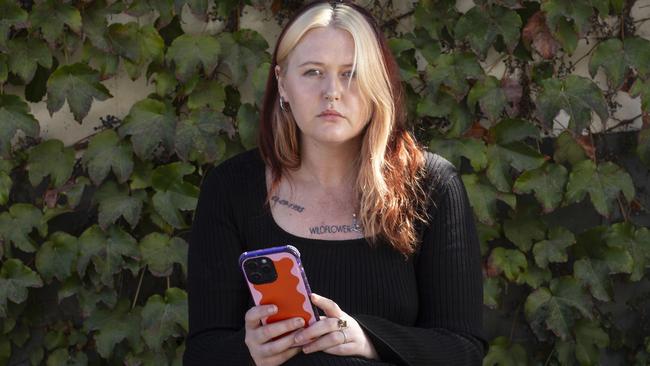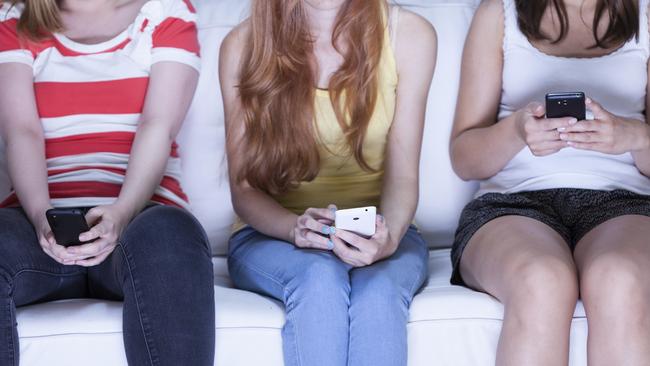Young Adelaide women discuss how sending nudes has become the norm
Women have revealed the confronting reality of the disturbing online trend that has gone unpunished for years.
Lifestyle
Don't miss out on the headlines from Lifestyle. Followed categories will be added to My News.
Unwanted explicit pictures are violating the phones of schoolgirls as young as nine and angry Adelaide women are still being bombarded with the illegal images years later.
The women – all 13 when they received their first unsolicited sext – say the damaging phenomenon has become “normalised” and all-pervasive for tween girls, teens and young women.
Latest official figures say almost half of all 14 to 17-year-olds have received a sexual message from someone online but the women say they believe the reach is almost absolute.
“I don’t know any of my friends who have not received a d--k pic, not a single one,” said small business owner and creative Es Winter, who has been inflicted with hundreds of unwanted images since she was a 13-year-old schoolgirl in Port Pirie.
“I was absolutely not ready for it, it was very confronting at that young age.”
Ms Winter said she feared it would be “even worse” for children today.
“I know a little girl who was nine when she got her first image last year … she’s still struggling to be around boys at school,” she said.
“I’m 31 and I’m still receiving them … it’s so deranged the way that they (men) think they can do it.
“I’ve never got one and not been fully shaken by it … I’ve never felt safe when I’ve got one. It’s always to me felt like someone was trying to assert their dominance over me.”

Gina – who was 13 when she was sent her first penis picture, opening a floodgate that still rages 11 years later – said she did not know “a single person” who had not been affected.
Gina’s schoolmate, Riley, said she used to receive three or four explicit images a week from strangers and even schoolmates when she was in her early teens.
“It was almost like a rite of passage when you’re young, these things just happen to you,” the 24-year-old said. “It must be even worse for girls today.”
It reached a nadir for Riley, Gina and their friend, Sophie, as young schoolgirls when their details were included in a host of Snapchat handles that were secretly posted on an online forum.
“I got hundreds of adds (requests to connect) from guys whose DPs (display picture) were just their penis,” said Sophie.

“They were strangers, probably old men, from all over the world.”
Now mature women with thriving careers, which they have chosen to protect by not using their surnames, the schoolmates said they were still being sent explicit photos from men they knew and scores that they did not.
They described it as a neverending assault that had become so everyday, they felt powerless to stop it.
“It’s just a thing that happens – it sucks,” said Riley.
“I don’t think it’s all men but it’s definitely the overwhelming majority. You can tell a nice guy if he’s never sent a d--k pic.
“It does make it very easy to spot a red flag. You send me something and then I know I’m not interested in you.”
Flinders University associate lecturer in criminology Dr Tahlia Hart said her research suggested girls and women were “fed up” with nude pictures.
“Especially when it’s unsolicited and there’s no choice in what content they’re receiving,” said Dr Hart, whose thesis looked at the experiences of underaged users of adult platforms such as dating apps and OnlyFans.

Dr Hart spoke to 48 individuals aged 18 to 21 who were active on the adult platforms when they were under 18 and “technically shouldn’t be on them”.
“Young women were sick of dick pics, both when they were underage and now that they are adults and … are still receiving them,” she said.
“It appears to be very normal right across adulthood and adolescence.
“I think there’s a lot of normalisation between young people about sexting practices and because unsolicited pics have become quite a common occurrence, especially for young women, it creates a normalised environment for people to operate in.”
eSafety Commissioner Julie Inman Grant said data showed almost half of all young people aged 14 to 17 had received a sexual message from someone online and 71 per cent had seen sexual images online.
“Many young people have told us they don’t feel they can discuss these experiences with their
parents or carers due to shame, embarrassment or fear of judgment,” Ms Inman Grant said.
“On top of that, parental awareness of these experiences generally lags behind young people’s actual experiences.
“For example, only 12 per cent of parents and carers were aware their child has opened a message or link that showed naked people.”

Ms Inman Grant said her message to parents and carers was to “step up to the challenge of having regular conversations about consent and respecting boundaries from a young age”.
Parents needed to stress to the children as they got older that sending nudes or explicit images was “a form of tech-facilitated abuse”, she said.
She urged parents to explain to their children that sending and receiving nudes was “not a necessary part of a relationship” and that sharing, accessing, creating or asking for those pictures from someone who is under 18 risks criminal charges.





